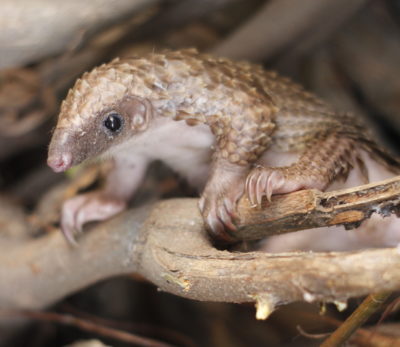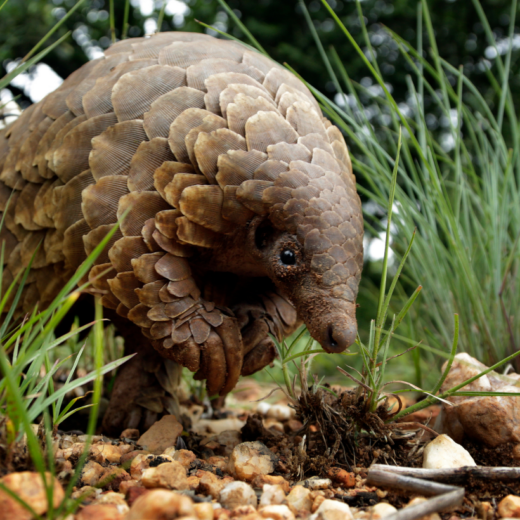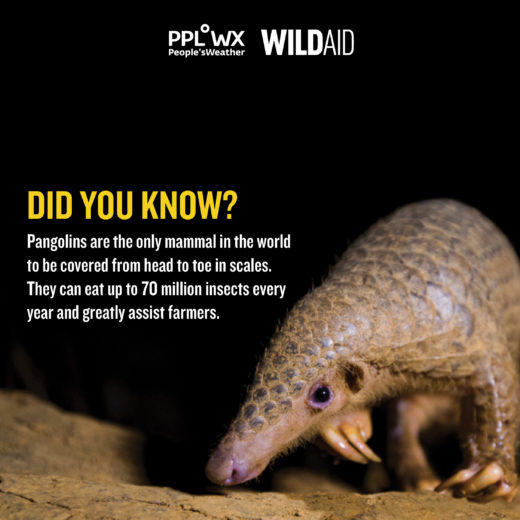
Pangolin scales have been removed from an official 2020 listing of ingredients approved for use in traditional Chinese medicine as reported by China’s Health Times newspaper. There was no official announcement but pangolins were not listed in the newly published 2020 edition of the traditional Chinese medicine (TCM) pharmacopeia.
This delisting comes after the country’s State Forestry and Grassland Administration (SFGA) last week raised the protected status of pangolins to the highest level.
“We highly applaud this announcement, made in recognition of the need to protect critically endangered pangolins,” Steve Blake, chief representative of WildAid in Beijing, told the Guardian.
“Along with upgrading pangolins to a national level 1 protected species, these two actions are crucial to help curb illegal trade,” Blake said. “This shows China’s rapidly strengthened commitment to protecting wildlife.”
China’s government upgraded pangolins from Class II to the highest-level Class I protection, affording the three species (Chinese, Sunda and Indian) that occur [or historically occurred] in China the same protection as the Giant Panda, with a penalty of 10 years imprisonment for those caught hunting, killing, smuggling or trading them.
While wild pangolin populations in China have been severely depleted by hunting and consumption, small numbers of the native Chinese Pangolin, classified as ‘Critically Endangered’ by IUCN, remain in parts of China. The government also announced plans to restore these populations by stepping up field patrols and habitat restoration efforts.
“The increased protection coupled with the swift and comprehensive closure of live wildlife markets and removal of many wild species from the list of what can be consumed as food in China were already very positive steps to saving the pangolin worldwide and reducing the possibility of them ever being a vector for disease. And now this announcement, effectively closing the legal sales of pangolin scales, shuts the last major loophole in pangolin protection efforts,” said WildAid CEO Peter Knights.
Pangolins have become a conservation priority globally in recent years as they are the most highly trafficked wild mammal, with upwards of 200,000 consumed annually for their meat and scales in parts of Asia. As pangolin populations in Asia have dwindled, an increase in shipments from Africa has emerged. In 2019 alone, authorities seized numerous massive shipments amounting to over 130 tons, which, depending on the species, could represent some 400,000 pangolins from Africa.
Pangolin scales are used in traditional medicine although leaders in the field maintain that there are ample sustainable substitutes for scales.
The COVID-19 pandemic has also placed a spotlight on the illegal trade in pangolins as some scientists have found a similar coronavirus in Sunda pangolins suggesting they may have served as an intermediary in the transmission from bats to humans, but this remains a matter of ongoing scientific debate.
“Whether pangolins prove to be the vector species in the case COVID-19 or not, trading and consuming them imposes a significant risk of the introduction of a new disease and we should move to eliminate this risk as quickly as possible,” said Knights.
WildAid joins Wildlife Conservation Society and Global Wildlife Conservation in the #EndTheTrade petition and campaign to end live wildlife markets and risky bushmeat consumption globally.
Last week, China’s National People’s Council announced it will strictly enforce its current ban on live wildlife markets and recently revamped laws on wildlife consumption to protect national security.
Premier Li Keqiang reported there will be “severe punishment for illegal hunting and trading of wild animals” and NPC Standing Committee chairman Li Zhanshu announced he will personally oversee inspections in eight provincial-level regions where wildlife trafficking has been pervasive.
Since February, WildAid has bolstered government announcements and communications urging the public to stop consuming wildlife with several media campaigns including a video featuring mega-star Jay Chou warning of the disease risk from consuming pangolins, which was viewed over 20 million times on social media within a few days and has since been placed on the start-up menu of Xiaomi TVs amassing 590 million views in the past two months. WildAid has also placed over 250 billboards urging an end to the consumption of pangolins and a call to help protect them in prominent locations such as the subways of Guangzhou and Beijing, Kunming railway station, shopping mall in Xiamen, and a four-story installation across from the Alibaba headquarters in Hangzhou. Recent social media campaigns on pangolins with The People’s Daily and messages from other prominent celebrities such as Angelababy have garnered over 180 million views.
Stay in touch and get the latest WildAid updates.
SIGN UP


